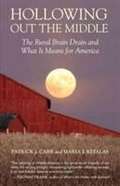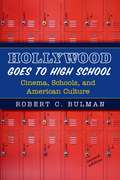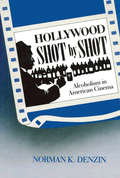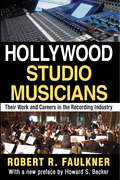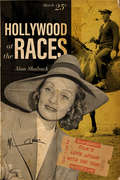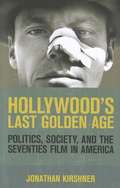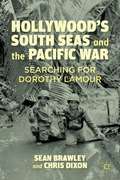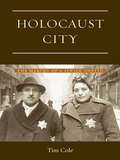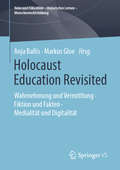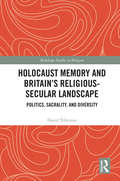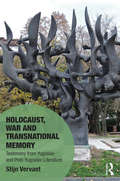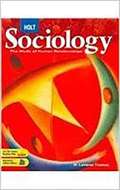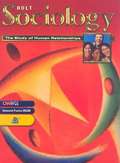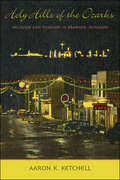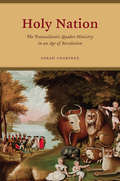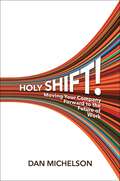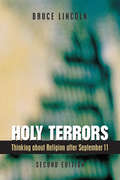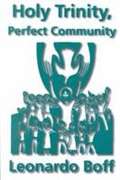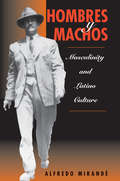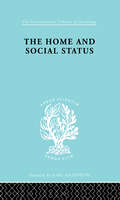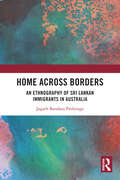- Table View
- List View
Hollowing Out the Middle
by Patrick J. Carr Maria J. KefalasIn 2001, with funding from the MacArthur Foundation, sociologists Patrick J. Carr and Maria J. Kefalas moved to Iowa to understand the rural brain drain and the exodus of young people from America's countryside. They met and followed working-class "stayers"; ambitious and college-bound "achievers"; "seekers," who head off to war to see what the world beyond offers; and "returners," who eventually circle back to their hometowns. What surprised them most was that adults in the community were playing a pivotal part in the town's decline by pushing the best and brightest young people to leave. In a timely, new afterword, Carr and Kefalas address the question "so what can be done to save our communities?" They profile the efforts of dedicated community leaders actively resisting the hollowing out of Middle America. These individuals have creatively engaged small town youth-stayers and returners, seekers and achievers-and have implemented a variety of programs to combat the rural brain drain. These stories of civic engagement will certainly inspire and encourage readers struggling to defend their communities. From the Trade Paperback edition.
Hollywood Goes to High School
by Robert BulmanWhat do films such as The Breakfast Club, Dead Poet’s Society, and Freedom Writers have to teach us about American culture? Robert Bulman’s Hollywood Goes to High School takes the reader on a fascinating journey through the high school film genre. Skillfully blending sociological theory and film analysis, Bulman’s always accessible writing delightfully challenges the reader to think critically about American individualism and class inequality. Bulman’s insightful sociological analysis of 177 new and classic high school films explores the complex ways in which Americans make sense of social class, education, gender and adolescence. Suitable for the beginning and advanced student, Hollywood Goes to High School is an essential piece of reading for a variety of courses in sociology, education, communication, anthropology, American studies, and film studies.
Hollywood Shot by Shot: Alcoholism in American Cinema (Communication And Social Order Ser.)
by Norman K. DenzinTo what extent have Hollywood feature films shaped the meanings that Americans attach to alcoholics, their families, and the alcoholic condition? To what extent has the mass culture of the movie industry itself been conceptually shaped by a broad, external societal discourse? Norman Denzin brings to his life-long study of alcoholism a searching interest in how cultural texts signify and lend themselves to interpretation within a social nexus. Both historical and diachronic in his approach, Denzin identifies five periods in the alcoholism films made between 1932 and the end of the 1980s, and offers a detailed critical reading of thirty-seven films produced during these six decades.
Hollywood Studio Musicians: Their Work and Careers in the Recording Industry
by Robert R. FaulknerWhen originally published in 1971, Hollywood Studio Musicians was the first detailed analysis of the work and careers of production personnel in an industry devoted to mass culture. Previously, most researchers overlooked mass-culture industries as work settings, preferring to focus on content rather than the artists who created it. This lucid and insightful book looks under the hood of the Hollywood film scoring and recording industry, focusing upon the careers and work of top-flight musicians. A new preface by Howard S. Becker highlights the study's historical context and importance.Based upon in-depth interviews with freelance musicians, Faulkner provides original insights into how we conceptualize occupations as well as the highly stratified system of professional prestige that results in what we now call the "A-List." Faulkner develops a framework for discovering and exploring how rapidly changing and demanding freelance work induces status hierarchies, sustains and updates collegial reputations, tightens social networks between contractors, and musicians, and restricts access to upward career paths.This volume is a gem, a masterpiece of field research combined with probing, theoretically informed analysis. Aside from the value of its own findings, the volume offers students of sociology, film, and other creative industries a prime example of how to do good social science research. In short, it is a model for investigators to turn to when their own research needs help, an exemplar of how research is done when it is done well.
Hollywood at the Races: Film's Love Affair with the Turf
by Alan Shuback“An informative and amusing look at the close relationship between Golden Age Hollywood and West Coast horse racing. A fascinating read.” —Christina Rice, author of Mean . . . Moody . . . Magnificent!Horse racing was so popular and influential between 1930 and 1960 that nearly 150 racing themed films were released, including A Day at the Races, Thoroughbreds Don’t Cry, and National Velvet.This fast-paced, gossipy history explores the relationship between the Hollywood film industry, the horse racing industry, and the extraordinary participation of producers, directors, and actors in the Sport of Kings. Alan Shuback details how all three of Southern California’s major racetracks were founded by Hollywood luminaries: Hal Roach was cofounder of Santa Anita Park, Bing Crosby founded Del Mar with help from Pat O’Brien, and Jack and Harry Warner founded Hollywood Park with help from dozens of people in the film community.The races also provided a social and sporting outlet for the film community—studios encouraged film stars to spend a day at the races, especially when a new film was being released. The stars’ presence at the track generated a bevy of attention from eager photographers and movie columnists, as well as free publicity for their new films. Moreover, Louis B. Mayer, Bing Crosby, Fred Astaire, Betty Grable, and Don Ameche were all major Thoroughbred owners, while Mickey Rooney, Chico Marx, and John Huston were notorious for their unsuccessful forays to the betting windows.“The more entertaining vignettes pair the names of old-time screen stars with ribald tales of racetrack depravity.” —Thoroughbred Daily News
Hollywood's Last Golden Age
by Jonathan KirshnerBetween 1967 and 1976 a number of extraordinary factors converged to produce an uncommonly adventurous era in the history of American film. The end of censorship, the decline of the studio system, economic changes in the industry, and demographic shifts among audiences, filmmakers, and critics created an unprecedented opportunity for a new type of Hollywood movie, one that Jonathan Kirshner identifies as the "seventies film." In Hollywood's Last Golden Age, Kirshner shows the ways in which key films from this period-including Chinatown, Five Easy Pieces, The Graduate, and Nashville, as well as underappreciated films such as The Friends of Eddie Coyle, Klute, and Night Moves-were important works of art in continuous dialogue with the political, social, personal, and philosophical issues of their times. These "seventies films" reflected the era's social and political upheavals: the civil rights movement, the domestic consequences of the Vietnam war, the sexual revolution, women's liberation, the end of the long postwar economic boom, the Shakespearean saga of the Nixon Administration and Watergate. Hollywood films, in this brief, exceptional moment, embraced a new aesthetic and a new approach to storytelling, creating self-consciously gritty, character-driven explorations of moral and narrative ambiguity. Although the rise of the blockbuster in the second half of the 1970s largely ended Hollywood's embrace of more challenging films, Kirshner argues that seventies filmmakers showed that it was possible to combine commercial entertainment with serious explorations of politics, society, and characters' interior lives.
Hollywood’s South Seas and the Pacific War
by Chris Dixon Sean BrawleyThis book explores the expectations, experiences, and reactions of Allied servicemen and women who served in the wartime Pacific and viewed the South Pacific through the lens of Hollywood's South Seas. Based on extensive archival research, it explores the intersections between military experiences and cultural history.
Holocaust City: The Making of a Jewish Ghetto
by Tim ColeDrawing from the ideas of critical geography and based on extensive archival research, Cole brilliantly reconstructs the formation of the Jewish ghetto during the Holocaust, focusing primarily on the ghetto in Budapest, Hungary--one of the largest created during the war, but rarely examined. Cole maps the city illustrating how spaces--cafes, theaters, bars, bathhouses--became divided in two. Throughout the book, Cole discusses how the creation of this Jewish ghetto, just like the others being built across occupied Europe, tells us a great deal about the nature of Nazism, what life was like under Nazi-occupation, and the role the ghetto actually played in the Final Solution.
Holocaust Education Revisited: Wahrnehmung und Vermittlung • Fiktion und Fakten • Medialität und Digitalität (Holocaust Education – Historisches Lernen – Menschenrechtsbildung)
by Markus Gloe Anja BallisDer Band wendet sich Konzepten von „Holocaust Education“ zu, die auf einer Tagung an der LMU München im Februar 2018 diskutiert worden sind: Wissenschaftlerinnen und Wissenschaftler verschiedener Disziplinen reflektierten über Zieldimensionen, mediale Repräsentationen sowie Wandel und Herausforderungen bei der Vermittlung der Themenfelder Holocaust und NS-Verbrechen. Die kritische Auseinandersetzung mit Konzepten von „Holocaust Education“ hat sich auch im 21. Jahrhundert als produktiv erwiesen: Es kann ein vielstimmiger und auf die Gegenwart bezogener Diskurs entfaltet werden, der von Fragen der Vermittlung im Klassenzimmer bis zu der Virtualisierung von Zeugenschaft in Museen und daraus resultierender didaktischer Konsequenzen reicht. Der InhaltZur Einführung • Wahrnehmung und Vermittlung • Fiktionen und Fakten • Medialität und DigitalitätDie HerausgeberDr. Anja Ballis ist Professorin am Fachbereich Didaktik der deutschen Sprache und Literatur der Ludwig-Maximilians-Universität München.Dr. Markus Gloe ist Professor am Fachbereich Politische Bildung und Didaktik der Sozialkunde an der Ludwig-Maximilians-Universität München.
Holocaust Memory and Britain’s Religious-Secular Landscape: Politics, Sacrality, And Diversity (Routledge Studies in Religion)
by David TollertonBritish state-supported Holocaust remembrance has dramatically grown in prominence since the 1990s. This monograph provides the first substantial discussion of the interface between public Holocaust memory in contemporary Britain and the nation’s changing religious-secular landscape. In the first half of the book attention is given to the relationships between remembrance activities and Jewish, Muslim, Christian, and post-Christian communities. Such relationships are far from monolithic, being entangled in diverse histories, identities, power-structures, and notions of ‘British values’. In the book’s second half, the focus turns to ways in which public initiatives concerned with Holocaust commemoration and education are intertwined with evocations and perceptions of the sacred. Three state-supported endeavours are addressed in detail: Holocaust Memorial Day, plans for a major new memorial site in London, and school visits to Auschwitz. Considering these phenomena through concepts of ritual, sacred space, and pilgrimage, it is proposed that response to the Holocaust has become a key feature of Britain’s 21st century religious-secular landscape. Critical consideration of these topics, it is argued, is necessary for both a better understanding of religious-secular change in modern Britain and a sustainable culture of remembrance and national self-examination. This is the first study to examine Holocaust remembrance and British religiosity/secularity in relation to one another. As such, it will be of keen interest to scholars of Religious Studies, Jewish studies and Holocaust Studies, as well as the Sociology of Religion, Material Religion and Secularism.
Holocaust and Conceptions of German: The Elephant in the Room (Holocaust Education – Historisches Lernen – Menschenrechtsbildung)
by Marc-Philip Hermann-CohenThe Holocaust is inseparable from the Israeli identities even seven decades following the atrocities during World War II, Israeli daily life is shaped by the horrible crimes committed by the Nazis. This book conceptualizes the intricacies of the Israeli identity in relation to learning German as a foreign language (GFL) in Israel throughout the course of history and the changing conception of Germany. This book includes an analysis of a selection of twenty-five GFL language books which reflect the stigmatization and tabooization of the Holocaust and also the qualitative analysis of a subject pool of 105 learners of GFL. The author finds that identities are co-constituted by four individualized Thought Styles, a concept borrowed from Ludwik Fleck. Thought Styles capture the individual perspective of the language learner’s view of Germany and are categorized in this thesis as German Engineering, Cold Germany, Neo-Nazi Germany, and The Other Germany. The research draws from discourse theory, critical psychology, and the oft-overlooked classical theory of Ludwik Fleck. Although the relationship between Germany and Israel has been amicable for the last six decades, the choice for Israelis to learn the language that was used by a nation that once attempted to eradicate the Jewish people is emotive and infinitely complex.
Holocaust, War and Transnational Memory: Testimony from Yugoslav and Post-Yugoslav Literature (Memory Studies: Global Constellations)
by Stijn VervaetUntil now, there has been little scholarly attention given to the ways in which Eastern European Holocaust fiction can contribute to current debates about transnational and transgenerational memory. Yugoslav and post-Yugoslav literary narratives about the Holocaust offer a particularly interesting case because time and again Holocaust memory is represented as intersecting with other stories of extreme violence: with the suffering of the non-Jewish South-Slav population during the Second World War, with the fate of victims of Stalinist terror, and with the victims of ethnic cleansing in the Yugoslav wars of the 1990s. This book examines the emergence and transformations of Holocaust memory in the socialist Yugoslav and post-Yugoslav eras. It discusses literary texts about the Holocaust by Yugoslav and post-Yugoslav writers, situating their oeuvre in the historical and discursive context in which it emerged and paying attention to its reception at the time. The book shows how in the writing of different generational groups (the survivor generation, the 1.5, and the second and third generations), the Holocaust is a motif for understanding the nature of extreme violence, locally and globally. The book offers comparative studies of several authors as well as readings of the work of individual writers. It uncovers forgotten authors and discusses internationally well-known and translated authors such as Danilo Kiš and David Albahari. By focusing on work by Jewish and non-Jewish authors of three generations, it sheds light on the ethical and aesthetical aspects of the transgenerational transmission of Holocaust memory in the Yugoslav context. As such, this book will appeal to both students and scholars of Holocaust studies, cultural memory studies, literary studies, cultural history, cultural sociology, Balkan studies, and Eastern European politics.
Holt Sociology: Student Edition Grades 9-12 2008 (Holt Sociology: The Study Of Human Relationships Ser.)
by Thomas Rinehart HoltTextbook on the study of human relationships.
Holt Sociology: The Study of Human Relationships
by W. La Verne ThomasThis text book contains Unit Lessons of Culture and Social Structure, The Individual in Society, Social Inequality, Social Institutions, The Changing Social World, and includes Case Studies, Interdisciplinary Activities, Technology Activities, Skill-Building Activities, Tables, Charts, Graphs and Maps.
Holt Sociology: The Study of Human Relationships
by W. Laverne ThomasMuch of the writing in this textbook is summarizing. The sociological data in this textbook has been collected from many sources. Summarizing all the characteristics of a society or even a social institution involves studying a large body of demographic, cultural, economic, geological, and historical information. Finding the Main Idea is the ability to identify the main point in a set of information. This textbook is designed to help you focus on the main ideas in sociology. The Read to Discover questions in each chapter help you identify the main ideas in each section. Identifying points of view helps us examine why people see things as they do. It also reinforces the realization that people's views may change over time or with a change in circumstances. Analyzing Information is the process of breaking something down into parts and examining the relationships between those parts. Comparing and Contrasting involve examining events, points of view, situations, or styles to identify their similarities and differences. Comparing focuses on both the similarities and the differences. Contrasting focuses only on the differences. Studying similarities and differences between people and things can give you clues about social theories, human interaction, and societies.
Holy Hills of the Ozarks: Religion and Tourism in Branson, Missouri (Lived Religions)
by Aaron K. KetchellOver the past century, Branson, Missouri, has attracted tens of millions of tourists. Nestled in the heart of the Ozark Mountains, it offers a rare and refreshing combination of natural beauty and family-friendly recreation—from scenic lakes and rolling hills to theme parks and variety shows. It has boasted of big name celebrities, like Wayne Newton, Andy Williams, and Petula Clark, as well as family entertainers like Mickey Gilley, the Shanghai Magic Troupe, Jim Stafford, and Yakov Smirnoff.But there is more to Branson's fame than just recreation. As Aaron K. Ketchell discovers, a popular variant of Christianity underscores all Branson's tourist attractions and fortifies every consumer success. In this lively and engaging study, Ketchell explores Branson's unique blend of religion and recreation. He explains how the city became a mecca of conservative Christianity—a place for a "spiritual vacation"—and how, through conscious effort, its residents and businesses continuously reinforce its inextricable connection with the divine. Ketchell combines the study of lived religion, popular culture, evangelicalism, and contemporary American history to present an accurate and honest account of a distinctly American phenomenon.
Holy Hills of the Ozarks: Religion and Tourism in Branson, Missouri (Lived Religions)
by Aaron K. Ketchell“Confronts readers with the implications of a popular tourist destination founded on the values and sentiments of American evangelical Protestantism.” —Thomas S. Bremer, Journal of the American Academy of ReligionOver the past century, Branson, Missouri, has attracted tens of millions of tourists. Nestled in the heart of the Ozark Mountains, it offers a rare and refreshing combination of natural beauty and family-friendly recreation—from scenic lakes and rolling hills to theme parks and variety shows. It has boasted of big-name celebrities, like Wayne Newton, Andy Williams, and Petula Clark, as well as family entertainers like Mickey Gilley, the Shanghai Magic Troupe, Jim Stafford, and Yakov Smirnoff.But there is more to Branson’s fame than just recreation. As Aaron K. Ketchell discovers, a popular variant of Christianity underscores all Branson’s tourist attractions and fortifies every consumer success. In this lively and engaging study, Ketchell explores Branson’s unique blend of religion and recreation. He explains how the city became a mecca of conservative Christianity—a place for a “spiritual vacation”—and how, through conscious effort, its residents and businesses continuously reinforce its inextricable connection with the divine.Ketchell combines the study of lived religion, popular culture, evangelicalism, and contemporary American history to present an accurate and honest account of a distinctly American phenomenon.“As Ketchell brilliantly argues, Branson entrepreneurs wove Christian sentiment ‘into a fabric of nostalgia, premodern longing, and whitewashed rusticity.’” —Matthew Avery Sutton, The Christian Century“At a time when Jim Wallis and other observers have forecast the end of the prominence of right-wing-religion on the U.S. political stage, this book will cause many readers to question that prediction.” —David Stricklin, The Journal of Southern History
Holy Nation: The Transatlantic Quaker Ministry in an Age of Revolution
by Sarah CrabtreeEarly American Quakers have long been perceived as retiring separatists, but in Holy Nation Sarah Crabtree transforms our historical understanding of the sect by drawing on the sermons, diaries, and correspondence of Quakers themselves. Situating Quakerism within the larger intellectual and religious undercurrents of the Atlantic World, Crabtree shows how Quakers forged a paradoxical sense of their place in the world as militant warriors fighting for peace. She argues that during the turbulent Age of Revolution and Reaction, the Religious Society of Friends forged a "holy nation," a transnational community of like-minded believers committed first and foremost to divine law and to one another. Declaring themselves citizens of their own nation served to underscore the decidedly unholy nature of the nation-state, worldly governments, and profane laws. As a result, campaigns of persecution against the Friends escalated as those in power moved to declare Quakers aliens and traitors to their home countries. Holy Nation convincingly shows that ideals and actions were inseparable for the Society of Friends, yielding an account of Quakerism that is simultaneously a history of the faith and its adherents and a history of its confrontations with the wider world. Ultimately, Crabtree argues, the conflicts experienced between obligations of church and state that Quakers faced can illuminate similar contemporary struggles.
Holy Shift!: Moving Your Company Forward to the Future of Work
by Dan MichelsonHOLY SHIFT! Moving Your Company Forward to the Future of Work takes you on a fascinating journey to the heart of the single biggest and fastest shift in how we work and live in history. Readers and leaders at every level of an organization will discover stunningly practical ideas and actions that address the three big and thorny questions of our time: How did we get here, where do we go from here, and how do we get there?A visionary CEO with a track-record of building world-class company cultures, Dan Michelson combines a reflection of how we got to now with research on how companies are managing this moment to create a roadmap in the form of a strategic framework and pragmatic playbook. HOLY SHIFT! maps the three simple steps that you can take to create momentum to move your company forward to the future of work: STEP ONE: See the Shift – Understanding how we got to now helps us to determine where we should go from here. We&’re living through a truly stunning and historical change. In other words, shift has happened. STEP TWO: Shift Your Mindset – A shift in thinking is now needed to help you turn culture into a strategy for your company. It&’s time to pivot to an approach that truly brings people together. STEP THREE: Make Shift Happen – Here&’s your strategic framework and playbook to help people on your team feel like they are part of the CORE and connected to your company, culture, and their co-workers. This is truly a once-in-a-lifetime opportunity for leaders to lead. It&’s time to move forward. Welcome to HOLY SHIFT!
Holy Terrors: Thinking about Religion after September 11
by Bruce LincolnIt is tempting to regard the perpetrators of the September 11th terrorist attacks as evil incarnate. But their motives, as Bruce Lincoln's acclaimed Holy Terrors makes clear, were profoundly and intensely religious. Thus what we need after the events of 9/11, Lincoln argues, is greater clarity about what we take religion to be.
Holy Trinity, Perfect Community
by Phillip Berryman Leonardo BoffIn a series of clear, short chapters, Leonardo Boff unpacks the mysteries of Trinitarian faith, showing why it makes a difference to believe that God is communion rather than solitude. Instead of God as solitary ruler standing above a static universe, Christian belief in the Trinity means that at the root of everything there is movement, an eternal process of life, outward movement, and love. Boff shows how the Holy Trinity is, among other things, the image of the perfect community and the image of the church in its ideal form: not a hierarchy of power, but a community of diverse gifts and functions. Ideal for study or personal reflection.
Hombres y Machos: Masculinity and Latino Culture
by Alfredo MirandeAlthough patriarchy, machismo, and excessive masculine displays are assumed to be prevalent among Latinos in general and Mexicans in particular, little is known about Latino men or macho masculinity. Hombres y Machos: Masculinity and Latino Culture fills an important void by providing an integrated view of Latino men, masculinity, and fatherhood?in the process refuting many common myths and misconceptions. <p>Examining how Latino men view themselves, Alfredo Mirande argues that prevailing conceptions of men, masculinity, and gender are inadequate because they are based not on universal norms but on limited and culturally specific conceptions. Findings are presented from in-depth personal interviews with Latino men (specifically, fathers with at least one child between the ages of four and eighteen living at home) from four geographical regions and from a broad cross-section of the Latino population: working and middle class, foreign-born and native-born. Topics range from views on machos and machismo to beliefs regarding masculinity and fatherhood. In addition to reporting research findings and placing them within a historical context, Mirande draws important insights from his own life. <p>Hombres y Machos calls for the development of Chicano/Latino men's studies and will be a significant and provocative addition to the growing literature on gender, masculinity, and race. It will appeal to the general reader and is bound to be an important supplementary text for courses in ethnic studies, women's studies, men's studies, family studies, sociology, psychology, social work, and law.
Home & Social Status Ils 111 (International Library of Sociology)
by Dennis ChapmanThis is Volume X of twenty-one in a series on Race, Class and Social Structure. Originally published in 1955, this study includes a number of essays on the topic the sociology of housing which is complicated because it is inextricably entangled with the 'housing problem'. The complex of interrelated matters with which this branch of sociology is concerned includes institutional behaviour, the family social status, property, religion, the law and the state and their relation to architecture, and engineering, sanitary engineering, town planning, public health, medicine and social administration.
Home (Key Ideas in Geography)
by Alison Blunt Robyn DowlingHome articulates a ‘critical geography of home’ in which home is understood as an emotive place and spatial imaginary that encompasses lived experiences of everyday, domestic life alongside a wider, and often contested, sense of being and belonging in the world. Engaging with the burgeoning cross-disciplinary interest in home since the first edition was published, this significantly revised and updated second edition contains new research boxes, illustrations, and contemporary examples throughout. It also adds a new chapter on ‘Home and the City’ that extends the scalar understanding of home to the urban. The book develops the conceptual and methodological underpinnings of a critical geography of home, drawing on key feminist, postcolonial, and housing thinkers as well as contemporary methodological currents in non-representational thinking and performance. The book’s chapters consider the making and unmaking of home across the domestic scale – house-as-home; the urban – city-as-home; national – nation-as-home; and homemaking in relation to transnational migration and diaspora. Each chapter includes illustrative examples from diverse geographical contexts and historical time periods. Chapters also address some of the key cross-cutting dimensions of home across these scales, including digital connectivity, art and performance, more-than-human constructions of home, and violence and dispossession. The book ends with a research agenda for home in a world of COVID-19. The book provides an understanding of home that has three intersecting dimensions: that material and imaginative geographies of home are closely intertwined; that home, power, and identity are intimately linked; and that geographies of home are multi-scalar. This framework, the examples used to illustrate it, and the intended audience of academics and students across the humanities and social sciences will together shape the field of home studies into the future.
Home Across Borders: An Ethnography of Sri Lankan Immigrants in Australia
by Jagath Bandara PathirageThis book studies how transnational migrants create a sense of home in their host countries. It draws on case studies of Sri Lankan migrants living in Australia to argue that 'home' is an existential experience rather than a fixed entity. The author looks at how the sense of home arises as a fresh category which is critical in defining one’s existentiality in the host society.Going beyond the conventional methodological approach of an ethnographer objectivizing other’s sense of home into fixed categories, the book attempts to foreground the immigrant’s articulation of home which evolves parallel to their being. It reveals how three important aspects of our lives – time, space and memory – intersect with the trajectories of migration. The author also delves into the ways in which migrants engage in building a home as a way of creating materiality in their dwelling practice.Unique and compelling, the book will be highly useful in studies of diaspora, globalisation and transnational migration. It will be of interest to students, researchers and scholars of anthropology, migration and transnational studies, as well as sociology and other related disciplines.
